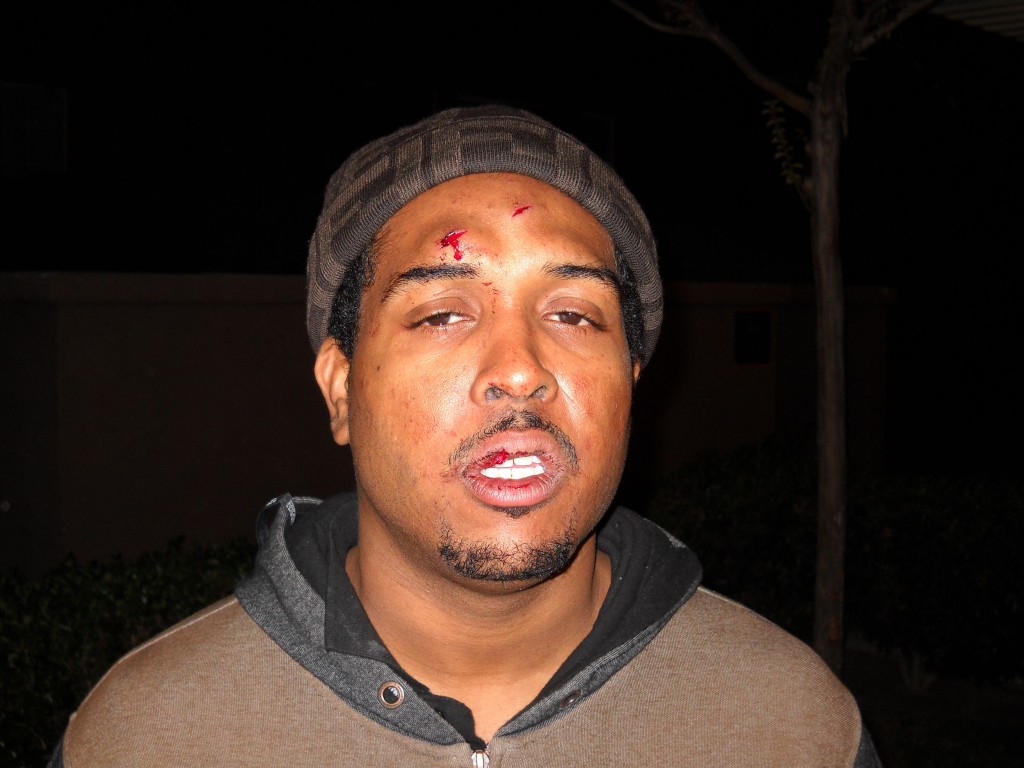The Albert Moyer Story: “Justice of Just US”
Ten years ago a young black man moved to California on a quest to succeed in life-in essence seeking the “California dream” little did he know what began as a dream would seemingly become a living nightmare.
Albert Joseph Moyer stems from a devoted family which holds a strong belief in faith, and education. Albert experienced great success in California venturing off in becoming an entrepreneur; following in the footsteps of long line of family members who proceeded him: a grandfather who was a mechanic, his uncle who owns several dental labs in Michigan and Ohio, his mother and father, Godfather Dave Bing, an Uncle who has a Ph. D in chemical engineering, a Godmother who serves as federal judge and a host of other successful family members.
Albert started a clothing company “Touche” which he successful managed until the economic downturn of 2008 forced him out of business. He managed and helped produce an up and coming  local artists (his cousin Rob J setting up tours in the Middle East with the USO. Albert also ventured off into other ventures such as solar (PTR Solar). However, Albert most viable venture was coordinating petition drives under the late Jean Nuisse, where he created and branded “Petition Management”. As his business grew he became extremely successful building relationships with local and state elected officials, often assisting them with voter registration drives and ballot initiatives, managing approximately 30-40 employees whom consistently worked for him.
local artists (his cousin Rob J setting up tours in the Middle East with the USO. Albert also ventured off into other ventures such as solar (PTR Solar). However, Albert most viable venture was coordinating petition drives under the late Jean Nuisse, where he created and branded “Petition Management”. As his business grew he became extremely successful building relationships with local and state elected officials, often assisting them with voter registration drives and ballot initiatives, managing approximately 30-40 employees whom consistently worked for him.
During this time Albert met his California dream girl whom he courted for several years eventually asking her hand in marriage. Albert was unaware of this woman’s mental status associated with her alleged sexual abuse by her father. She medicated herself in using several over the counter drugs prescribed by her physician and other prescriptions which weren’t prescribed by her physician. Eventually, her issues came to light and as they progressed, he believed through prayer and love he could provide a solid foundation by to sustain their relationship. Yet, he uncovered as originally stated by his family and close friends she was more interested in what Albert could do for her as opposed to the love and stability he attempted to provide.
During the Fall of 2013 Albert made a very concerning phone call to his sister and aunt who are both in the medical field stating “I don’t know what is wrong with her. She’s foaming at the mouth, what should I do?” When asked what happened Albert stated that she had been drinking and took her medication (Xanax Immediately). He was advised to take her to the hospital. When Albert arrived at the hospital he was told that she also had cocaine in her system. This came as a disappointing shock to Mr. Moyer as he didn’t have a clue she was prescribed Xanax and had been experimenting with cocaine.
A couple months after this episode Albert and this young lady had a domestic dispute which resulted in him being arrested after a neighbor called the police. The story the DA is trying to inaccurately portray is that Mr. Moyer initiated the attack which is false as she was the aggressor.
Mr. Moyer was on the phone outside of their shared apartment with his sister when the alleged victim attacked him because she assumed he was on the phone with another woman.
She attacked Mr. Moyer with a glass candle holder and when the police arrived the EMT attempted to stop the bleeding. Having been injured he went to a local hospital in Riverside county and as a result of her hitting him in the face and head with candle stick holder he had several lacerations both to the face and mouth and received several stitches 7 stitches to his forehead and mouth.
The alleged victim refused medical attention at the time, as she had a slightly busted lip and a couple of bruises on her arm. This occurred as he acted in self-defense and attempted to subdue her and as a result she began to scream resulting in the neighbor contacting Corona PD because he heard her screaming “Get off of me”.
Albert was taken to jail and was charged with domestic violence. Although the police took a statement from her, they didn’t provide him with a chance to provide his story.
Later that day Albert was released on bond. Upon Albert’s release from jail he remained in California for a few months before coming home to live in Michigan as his father had been diagnosed with congestive heart failure.
During the time in which Albert was out on bail he and the alleged victim stayed in contact and even traveled together to Las Vegas in an attempt to mend their relationship and handle other pertinent business matters. In October of 2014 Albert was arrested in Michigan as a result of missing his first court date due to a family death and his father’s illness. Although Albert attempted to contact the Riverside Superior Court to explain the situation along with offering proof, they disregarded his efforts.
A few weeks prior to Albert being arrested at our home his father and sister were pulled over in Farmington Hills, MI by the Farmington Hills Police Department during a routine traffic stop, and his father was detained for over an hour for the aforementioned reason. As a result Albert’s father, who shares the same name as his son, was admitted to the hospital due to heat exhaustion and stress from the situation (they believed Albert’s father was actually Albert, Jr. although he provided identification to prove otherwise).
When Albert was arrested by the Farmington Hills Police at our home in Michigan in October 2014, the arresting officer stated he was being arrested because he had a warrant out of California due to a failure to appear; however, the warrant was non- extraditable and the only remedy they had was to arrest and hold Albert for a local traffic warrant which was paid the next day at which point Al was released from custody and returned home.
Nearly two hours after Albert was released the Farmington Hills police came back to Albert’s home and asked him to step outside stating that they just wanted to speak with him. The moment he stepped outside they stated the warrant had been revised and he was taken into custody and transferred to Oakland County Jail in Michigan for almost a month. During that time Albert’s family hired Attorney Folmar, who attempt to fight on his behalf. She indicated something was strange the situation in that not only had he been arrested twice in the same day but additionally the warrant had been modified from non-extraditable to extraditable without a judges signature. Despite her attempt to fight on his behalf Attorney Folmar was unsuccessful in blocking his extradition as he was flown to California for his court hearing.
During the bail hearing in CA his bail was set at $125,000 and he was subsequently released after posting bond. It was at this juncture Albert moved in with his Godmother Judge Crawford , a Federal Judge in Seattle, Washington to avoid missing any future court dates in California.
He did not vacate any future court appearances and since that time had been out of custody for approximately 18 months until his court appearance on May 25th, 2015 during which he was remanded into custody.
Prior to the May 29th court date the alleged victim did not show up to any court hearings and called Albert on October 30, 2014 to state, “I love you, and I am not pressing charges. I will be present at the next court date to see you, but I will not cooperate with the prosecutor”.
On 12/12/2014 the alleged victim indicated she was staying out of reach of the prosecutor because, “We both made a mistake”. Not only did she miss the first court date but never made an appearance for 18 months. In March 2015 a new prosecutor (Alberto Recalde) was assigned to his case and stated “I am one of the best, and will have several private investigators locate the victim and make her testify against you if you don’t take this plea deal of four years and eight months”.
During his preliminary hearing in May the alleged victim testified against him and in several instances committed perjury while under oath. Due to her malicious testimony his charges escalated from domestic violence to attempted murder within a matter of hours, resulting in his bail not only increasing (increased from 125k to 1M) but him being remanded into custody. Since this time he has remained incarcerated in the Riverside County Jail.
The DA is attempting to demonstrate Mr. Moyer choked her three times as she supposedly stated at the prelim hearing. However, we have a statement from a plastic surgeons and dermatologist stating that those are not choke marks on her neck but in fact acne, and we have other witnesses who can attest to this fact (i.e. the acne on her neck). I have included these pictures of her and Albert from the night of the incident.
Summary
Albert had ineffective counsel during the preliminary hearing. For the record, Albert’s first deal was take a felony, go home and with probation, time served and after and year with good behavior it will dropped down to a misdemeanor. Thus one must question why would the court be comfortable with reducing a violent felony to a misdemeanor only then to retaliate by charging him with attempted murder charges and yet all the circumstances remained the same, devoid her perjurious testimony.
Albert has no prior arrest record, nor acts of violence which would predicate maliciously enhancing his charges. The alleged victim was on depression medication long before this incident, and even quit her job, after which she received State Disability due to the fact that she could not work because of the constant depression, migraines and unstable thoughts that she had been having.
Throughout this time Albert posed no threat to the alleged victim, while her testimony contradicted her originally police statement in indicating she feared for her life at the preliminary hearing. Yet she traveled with him to Las Vegas and less than a year prior and had remained in contact with both he and his family throughout the 18 month period prior to her appearing at his preliminary hearing. She even went so far as to suggest she’d had no contact with Albert the entire time, no contact with his family, even stated on the record it was a “coincidence” they’d met in Las Vegas.
However, Albert has the plane ticket that he bought for her to fly to Vegas to meet him and there are several text messages demonstrating she not only traveled with him, but had remained in contact with the family over the course of the 18 months prior to his May 25th preliminary hearing.
Faced the possibility of 15 years to Life prison everything Albert’s worked for now stands in jeopardy as a result of her perjurious pre-trial testimony and a malicious prosecution by the DA. The legal system in Riverside County Courthouse has disregarded the blatant violation of his civil rights. As we have learned Riverside County is well known for usurping justice in pursuit of filling beds, given the majority of this County’s revenue is generated through the court system (sending disproportionate number of minorities to jail).
It was later suggested by his 2nd hired attorney, Angela Friedrichs, the prosecutor had proceeded to trump up charges against Mr. Moyer due to a disagreement he had with his former attorney (Anthony Brooklier). Recalde stated that Mr. Brooklier was arrogant and that he blew him off when he approached him to discuss Albert’s case. Albert was not bound over in the proper time frame therefore the case should have been dismissed. At the time of the preliminary hearing Albert’s attorney of record, Anthony Brooklier, did not show up leaving the case to a stand in attorney from his office, Gevork Chilingaryan, who explained to Judge Schwartz and the prosecutor Alberto Recalde he’d just received Albert’s file the night before and was not prepared to proceed with the pre-trial hearing.
Gevork Chilingaryan requested the matter be adjourned until the following Monday due in part to him not being prepared to proceed and feeling uncomfortable representing Mr. Moyer on this matter; yet the court allowed them to proceed.
Albert has had several bond hearings yet no Judge has been willing to lower his bond, although Judge Matthew Perantoni has acknowledged on the record he is not a flight risk, nor a threat to the alleged victim. However, due to the attempted murder charge his bail remains at 1M dollars. Additionally it was stated that since Judge Bernard J. Schwartz set this bail, Judge Perantoni didn’t want to undermine his colleague in lowering the bail despite the evidence illustrating he is not a flight risk nor a threat to the alleged victim.
Albert’s civil rights have been violated in that he was extradited without a Judges signature on the amended arrest warrant in October 2015, he was not bound over in the allotted time frame as prescribed by law, and he had ineffective counsel during his pretrial hearing. Judge Matthew Perantoni stated on the record on January 27,2015 that he feels certain rights pertaining to Albert may have been violated, but there is nothing that can be done until he goes to trial.
Lastly, given Mr. Moyer went to the hospital had several stitches to mend his facial lacerations and the alleged victim did not receive medical attention, it’s difficult to comprehend the attempted murder charge.
We seek justice, not sympathy, in this matter for truly the criminal justice system has turned a blind eye.
 Westside Story Newspaper – Online The News of The Empire – Sharing the Quest for Excellence
Westside Story Newspaper – Online The News of The Empire – Sharing the Quest for Excellence


![Urban News Service - Oxitec male mosquitoes released from pot in Jacobina Brazil[13]](https://www.westsidestorynewspaper.com/wp-content/uploads/2016/05/Urban-News-Service-Oxitec-male-mosquitoes-released-from-pot-in-Jacobina-Brazil13-300x287.jpg)
